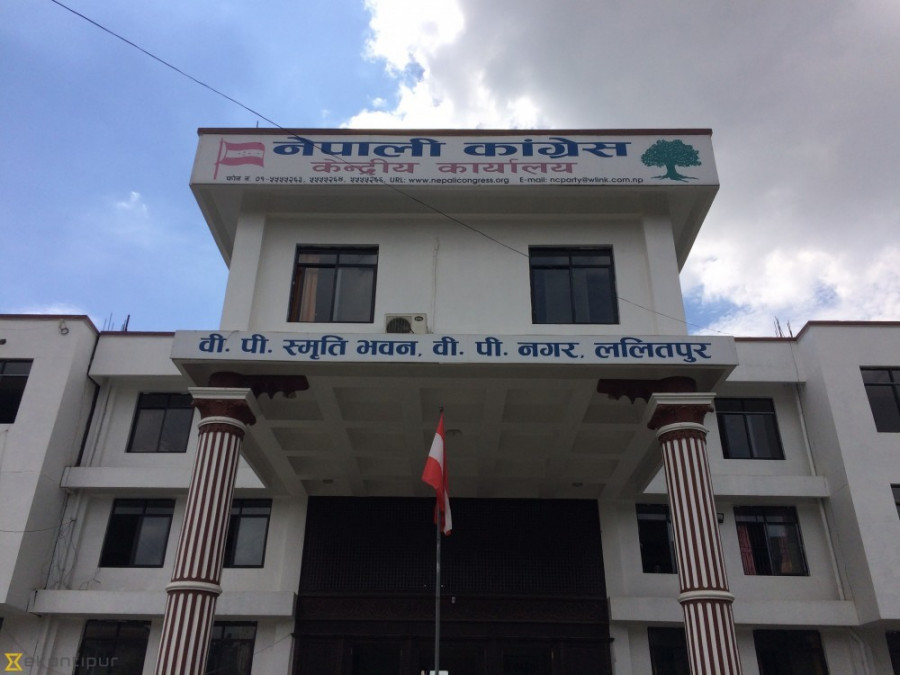Politics
Central committee to decide whether to form electoral alliances, Congress clarifies
Outcome cloudy of the four-day Mahasamiti as president Deuba and general secretary Thapa clashed on the issue.
Post Report
As the four-day Mahasamiti meeting failed to make a clear decision on whether the party should forge an electoral alliance with other political parties, the Nepali Congress leaders on Friday clarified that the party’s Central Working Committee is the final authority to decide the matter.
The agenda of whether the party should forge an alliance ahead of an election dominated the four-day Mahasamiti meeting with the delegates sharply divided for and against.
Gagan Kumar Thapa, a general secretary, while presenting the party’s organisational report in the meeting, proposed that the Congress should not forge any alliance with other parties in the upcoming elections. In the event participated by 2,373 Mahasamiti members from across the country, he presented several arguments as to why electoral alliances had been causing huge losses to the party’s organisational strength and frustrating the grand old party’s committed cadres and well-wishers as well. He proposed that the party should adopt a policy of contesting elections independently while forming coalitions if needed to garner a majority to form a government.
Thapa's proposal grabbed widespread attention and created ripples not only within the Congress but also in the ruling alliance.
The party said in a statement on Thursday that the meeting had endorsed all the reports presented by vice-chair Purna Bahadur Khadka and others by the general secretaries Thapa and Bishwa Prakash Sharma. At the same time, the party also stated that the meeting had mandated the Central Working Committee to give a final shape to the reports based on the feedback received at the meeting.
The party factions interpreted the decision to suit their interests.
While General Secretary Thapa lobbied hard to endorse the proposal to do away with electoral alliances, party president Sher Bahadur Deuba was against it.
The Central Working Committee will make the final call, Min Bishwakarma, the head of the party's publicity division, said on Friday during a press conference at the party headquarters.
Thapa, in his report, stated that hundreds of thousands of Congress leaders and cadres have expressed the desire to contest elections independently and are against forging alliances with any parties.
Thapa, however, is for giving continuity to the present coalition as per the inter-party understanding reached while forming the Dahal government.
Incorporating the suggestions and feedback from the Mahasamiti members, the Central Working Committee will modify the papers presented by Vice-president Purna Bahadur Khadka and general secretaries Thapa and Sharma, said Bishwakarma.
“The present coalition was formed in a ‘special situation’ and the Nepali Congress is committed to giving continuity to it for the full five years as per the inter-party agreement,” Bishwakarma said. “But different comments and reactions are coming from outside.”
After Thapa floated the proposal against forging new alliances, it also fuelled speculations, even prompting Prime Minister Pushpa Kamal Dahal to seek assurance from Congress President Deuba of the continuity of the coalition. The Congress chief met Prime Minister Dahal on Tuesday and Friday to assure him that the present coalition would continue for the full five years and Thapa's proposal had nothing to do with the fate and future of the present coalition.
“The proposal on whether to build a coalition ahead of the elections was widely discussed in the party. The Mahasamiti meeting decided to forward it to the Central Working Committee as decided by all senior party leaders including General Secretary Thapa,” said Bishwakarma. “The central committee will endorse the recommendations by the Mahasimit after necessary changes and amendments.”
The decision to form the present alliance was taken by the Central Working Committee, not the Mahasamiti, a Congress leader said. “We still have 45 months before the next elections. There is enough time to debate this issue.”
The Mahasamiti floor was clearly divided on whether the party should contest the elections independently or go for an alliance with other parties as it did in the recent elections. The factional wrangling within the Congress was visible during the deliberation at the meeting.
The establishment faction led by Deuba worked relentlessly to foil Thapa’s proposal. If the Congress officially takes a decision on not forging electoral alliances, it would give a reason for Prime Minister Dahal to sever ties with the Congress. Deuba wouldn’t want to irritate Dahal as he waits to become the prime minister in a rotational arrangement agreed between the coalition partners, a central committee member said.
The spirit of the 631 members who spoke at the meeting should be honoured while taking a decision on the issue of electoral alliances, Bishwakarma said.
The four-day Godavari meeting revolved around the issue of electoral alliances. The issue is strategic, not a policy decision, Bishawkarma asserted. Deuba commands a comfortable majority in the Central Working Committee.




 13.12°C Kathmandu
13.12°C Kathmandu













